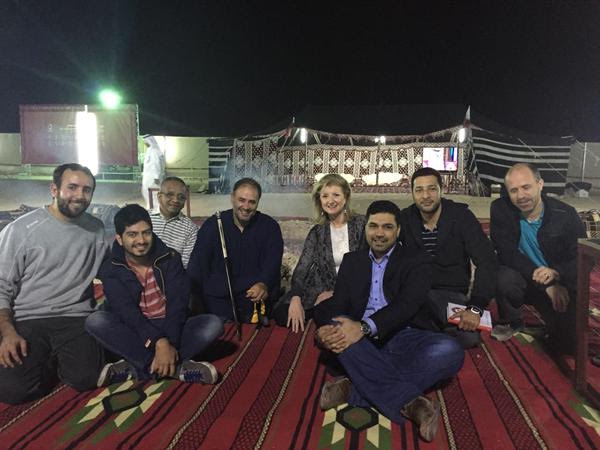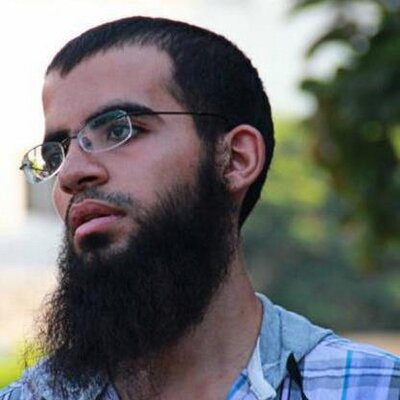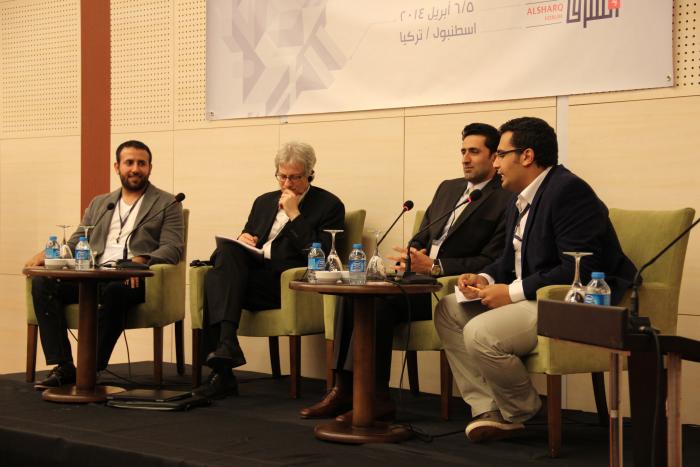
DIDN'T Arianna Huffington realise what she was getting into when she decided to launch HuffPost Arabi? In the first three weeks it has certainly been attracting attention, but mostly of the wrong sort.
The new Arabic-language website was born amid a show of bravado from Ms Huffington. Avoiding "any kind of censorship and control", she said, would be "absolutely key". For that reason it would be operating from London and Istanbul rather than any of the Arab countries, and would pursue stories "relentlessly".
She also vowed to back the website's writers to the hilt. "We will support [contributors] in every way," she said. "Anyone persecuted for opinions published on the site" would be given legal funding and "extensive coverage" across other sections of Huffington Post.
But promising that kind of blanket support to largely unknown writers for as-yet-unwritten articles was inviting trouble – especially considering that the editorial director of Huffington Post's Arabic offshoot is a Qatari known for his pro-Islamist stance and its Egyptian editor-in-chief is a self-declared member of the Muslim Brotherhood.
Last week Ms Huffington had to eat her words when HuffPost Arabi published a blog article by an Egyptian contributor casting aspersions on gay people. It was promptly deleted and replaced by a note saying:
"This blog should not have been published as it contradicts the Huffington Post's editorial positions and guidelines which are based on encouraging positive dialogue and mutual respect. It has therefore been taken down."
But there's plenty of still-undeleted material in Arabic that would probably alarm Huffington Post's traditional readers if they knew what it said.
A tribute to the late Taliban leader, Mullah Omar, for instance:
"His positive qualities were many, and from my experience I can say that his personality represented manliness in its loftiest meaning."
That comes from Tayseer Allouni, a former al-Jazeera correspondent in Afghanistan.
An article about the "unhealthy phenomena that threaten the Arab and Muslim community", by an Algerian "academic researcher", denounces the practice of taking selfies as a "sick phenomenon" that strikes at the sanctity of private life and the sanctity of religious rites.
For conspiracy theorists (and HuffPost Arabi claims not to be one of them) there's a long article about the Bilderberg group which quotes French "thinker" Thierry Meyssan as an expert on the subject. Meyssan has previously claimed that the 9/11 attacks were the work of the US government and that Bin Laden was working for the CIA.
This kind of behaviour by HuffPost Arabi has also begun to taint the English-language website which has already published two articles attempting to defend it. I'll return to those later.
The Khanfar connection
HUFFPOST Arabi is run "in partnership" with Integral Media Strategies, a British-registered company wholly owned by former al-Jazeera chief Wadah Khanfar. At present, though, it appears to be a partnership in which Khanfar – in his role as editorial director of HuffPost Arabi – is in the driving seat.
Palestinian-born Khanfar, who now has Qatari citizenship, previously held the posts of managing director and director general at al-Jazeera television. He left in 2011 for reasons that were never entirely clear and was replaced by a member of the Qatari royal family.
Khanfar "has always been seen as pro-Islamist", according to March Lynch, a political scientist who has written extensively about Arab media, and during his tenure at al-Jazeera some of its staff accused him of pushing the station in an Islamist direction.
Khanfar responded that having more "Islamic voices" at al-Jazeera merely reflected "political reality on the ground" in the Middle East.
While still in charge of al-Jazeera, Khanfar began developing a relationship with the Guardian newspaper in London. Early in 2011, they collaborated (here and here) in publishing "The Palestine Papers" – some 1,600 leaked Palestinian documents relating to peace talks with Israel.
The Palestine Papers shed some interesting light on the negotiating process which commentators interpreted in a variety of ways but they also raised questions about the motivation behind the leak. The man eventually identified as the whistleblower, Ziyad Clot, said he had contacted al-Jazeera out of frustration: "The peace process is a spectacle, a farce, played to the detriment of Palestinian reconciliation, at the cost of the bloodshed in Gaza."
Rightly or wrongly, some Palestinian officials interpreted al-Jazeera's involvement as evidence of machinations by the Emir of Qatar aimed at undermining President Mahmoud Abbas.
Since leaving al-Jazeera, Khanfar has written 18 opinion articles for the Guardian – several of them with clear Islamist sympathies. One article, in November 2011, referring to the rise of Ennahda in Tunisia, was headed: "Those who support democracy must welcome the rise of political Islam". Unusually for the Guardian, it appeared in both English and Arabic.
Several of Khanfar's other articles for the Guardian supported Morsi's presidency in Egypt (though not totally without criticism) and in October 2012 he wrote a glowing piece about his meeting with Somalia's new president, Hassan Sheikh Mohamud:
"Now in his 50s, he is a former chancellor of the University of Somalia and has no record of political strife. Instead, he is known for his extensive work within civil society and for his efforts to bring about national reconciliation."
Unlike a BBC profile of Mohamud three weeks earlier, Khanfar's article didn't mention the Somali president's Islamist connections.
Making acquaintances in Qatar
APART from the question of Islamist influences, one obvious problem with the Khanfar partnership is that it complicates HuffPost Arabi's position editorially. Articles are liable to be viewed as serving a Qatari agenda whether that is the actual intention or not. It also draws Huffington – unnecessarily – into a controversial media nexus centred around Khanfar.
Last December, while preparing for the launch of HuffPost Arabi, Arianna Huffington (who is also on the advisory board of the Doha Goals programme) paid a visit to Qatar.
Khanfar (fourth from left in the picture above) invited her for a campfire dinner in the desert together with selected guests.
One of these guests (far left in the photo) was Majid Adwan, who runs an Arabic language website called Sasa Post. According to the firm that designed its website (and produced a cheery little video about it), Sasa Post "aims to become a destination for news, blogs and original content offering coverage of Arab world politics, entertainment, life style, world news, technology and comedy".
But Sasa Post has some very nasty content.
One article is headed: "How can the Jews control the world's economy?" After discussing the Rothschild family, it goes on to talk about Jewish involvement in the arms trade, food companies and computers. A section headed "Jews control the media" begins:
"The Jews knew long ago that being in control of the media gives them ample room for 'brainwashing' humanity, leading to changing the facts in people's minds and presenting only the images they want in people's minds."
Another article, by Shihab al-Din al-Hawari who is described as a doctor and psychiatric consultant, links homosexuality to mental illness. It claims that "scientific councils" have been subordinated to "homosexual pressure groups" in the US, and "every specialist in psychiatry knows that homosexuality is strongly connected with mental disorders".

Another of the campfire dinner guests (far right in the group photo) was Jonathan Powell, an al-Jazeera executive. In 2013, Powell took a break of several months from al-Jazeera to help set up the London-based news website, Middle East Eye.
Powell told The National: "I left al-Jazeera ... to pursue a new opportunity but later returned after being offered a new role. I have a lot of experience in launching media organisations and was brought on as a consultant by Middle East Eye. This was entirely separate to my work with al-Jazeera."
Last year Middle East Eye figured in a 3,000-word investigative article by The National, an Emirati newspaper, about British-based organisations which were said have links to the Muslim Brotherhood. At the time the article appeared, the UAE was trying to persuade the British government to classify the Brotherhood as a terrorist organisation, so whatever the truth of its investigation The National probably had an axe to grind. Nevertheless, Middle East Eye is a rather mysterious organisation: nobody seems to know who really owns or finances it.
The editor of Middle East Eye is David Hearst, formerly chief foreign leader of The Guardian. Hearst also writes from time to time for the English section of Huffington Post.
Conference in Istanbul
WADAH KHANFAR also runs the Sharq Forum Foundation, registered in Switzerland. In April last year, Sharq held a two-day conference in Instanbul on "Future Directions for the Media" which brought together elements from the nexus around Khanfar.
After opening speeches by Khanfar and Robert Fisk (rather incongruously, since he objects to social media), a panel discussion featured Majid Adwan of Sasa Post, David Hearst of Middle East Eye and Asif Hamidi, a journalist from al-Jazeera.
Anas Fouda, the journalist and Muslim Brotherhood member who now edits HuffPost Arabi, also delivered a workshop entitled "Workflow in emerging media projects".
 |
HuffPost's defence
SINCE I posted my initial thoughts about HuffPost Arabi at the end of July, articles critical of the new website have appeared elsewhere – including BuzzFeed, the Independent and NOW. As'ad AbuKhalil, who blogs as the Angry Arab, has also been regularly noting some of the more absurd features of its content.
Huffington has hit back with a couple of articles in its English section – one by Chaker Khazaal, a Palestinian-Canadian writer, and the other by Ryan Grim, Huffington's Washington bureau chief.
Khazaal's article tries to downplay Anas Fouda's Brotherhood membership in a thoroughly dishonest way. In 2013, Fouda was arrested in the UAE – apparently on suspicion of engaging in Brotherhood activities – and detained for more than a month but eventually released without charge. Khazaal cites the lack of charges to imply that Fouda is not connected with the Brotherhood.
In fact, Fouda made no attempt to deny his Brotherhood membership, though he denied working for the Brotherhood while in the UAE. He said later:
"On the second day of my detention I was interrogated for around four hours, which was the only time I was questioned throughout my detention. They asked me if I was a Muslim Brotherhood activist. I told them I had been a member of the Muslim Brotherhood since 1988 but that in nearly 10 years of living in Dubai I had never been politically active."
Meanwhile, Grim's article makes a feeble attempt to justify publication of the now-deleted article discussing homosexuality:
"Take LGBT rights. The latest Pew survey in Jordan, Egypt and the Palestinian territories, for instance, found 94-95 percent of people saying they personally believe homosexuality is 'morally unacceptable'. In more tolerant Lebanon, 80 percent believe this."
Both these articles make questionable assertions about the editorial purpose of HuffPost Arabi which suggest the project is ill-conceived. They claim it is supporting press freedom in the Middle East and promoting diversity.
Khazaal, for instance, states:
"The lack of diverse and critical voices in the Arab world is one of the most acute symptoms of authoritarianism ... in most Arab countries, media is completely controlled by the state."
Twenty years ago, before the arrival of satellite TV and the internet, this would have been true. Today, though, despite continuing repression, there is a cacophony of voices in the region. The problem now is not so much access to ideas and information as how to sort out the wheat from the chaff.
HuffPost Arabi has placed itself in London and Istanbul supposedly so that it can say things which cannot be said in the Arab countries. But it's hard to find any articles on the website that could not have been published somewhere, by some outlet, in an Arab country.
Then there's the question of diversity. Grim seems to be arguing that publishing reactionary articles and others of a kind that western readers might object to makes HuffPost Arabi more representative of Arab public opinion. According to Grim, it's all part of allowing "open dialogue", but at present the talk of having a diversity of voices sounds more like an excuse for publishing any sort of rubbish.
Khazaal says:
"The hope is that the varied perspectives will spark productive discussion between people from different backgrounds or limited exposure to differing views."
That might make more sense if HuffPost Arabi was published in English, for American readers. But Arab readers have already had plenty of exposure to Islamist ideas and popular conspiracy theories. Simply regurgitating well-worn tropes without subjecting them to serious scrutiny doesn't actually move the debate forward. If anything, it reinforces the tropes by giving them the imprimatur of an American-owned website.

 RSS Feed
RSS Feed
